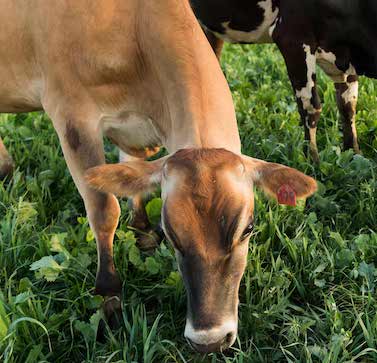"Grass fed" is a label often appearing on meat and dairy. It's a positive marketing signal because grass-fed is generally considered to be a healthier option than grain-fed. It's also better for the environment; grazing animals require no tilling of fields, and deposit their manure naturally, reducing their carbon footprint as compared to the inputs required for growing grain. Grazing animals can also co-exist with wildlife, unlike grain monocultures.
 In the case of meat "grass fed" most often applies to beef and lamb. Per pound, grass fed beef and lamb has less total fat, and therefore fewer calories. The nutritional content of that fat is also different. Grass fed beef has as much as five times the amount of omega-3 fatty acids as grain fed beef.
In the case of meat "grass fed" most often applies to beef and lamb. Per pound, grass fed beef and lamb has less total fat, and therefore fewer calories. The nutritional content of that fat is also different. Grass fed beef has as much as five times the amount of omega-3 fatty acids as grain fed beef.
In the case of dairy the label refers to the animal the milk comes from, most usually cows, but also commonly goats.
Both meat and dairy from grass fed animals contain 300–500% more conjugated linoleic acid (CLA) than from animals fed grain. The links below point to discussions of the benefits of these fatty acids. Vitamin and mineral content are also improved when no grain is consumed.
However in Canada nothing can be assumed from a label claiming "grass fed". Although in the U.S. it's a term regulated by the USDA to certify that the cattle or sheep are not fed any grain, in Canada there is no such regulation, either federally or provincially. In fact, no limit is placed on the amount of grain fed!
The Dairy Farmers of Canada (DFC) organization — "a farmer-funded and farmer-run organization (not a government body)" — proposed a national Standard in 2019. But the Milk Boards of the provinces did not accept it, and no certifying body was assigned. The Standard allowed 25% of the cow's diet to consist of grains and supplements. The refusal of the provincial Milk Boards eliminated even this upper limit. "Grass Fed" in Canada means nothing.
And unless the product is certified Organic, the "grain and supplements" may be practically anything. Certainly it can have been sprayed with pesticide, and may even be GMO, as would almost certainly be the case with beet pulp supplementation for example.
